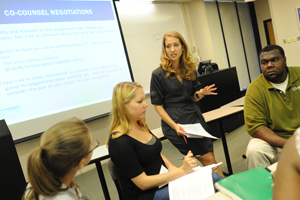A different kind of teaching
March 2, 2012
ATLANTA – In Assistant Professor Anne Tucker’s Tuesday afternoon class, small groups of students huddle together, scattered throughout the lecture hall. At least one student taps out notes on a laptop in each cluster; others pore over shared copies of a massive tome titled “Unincorporated Business Entities.” Tucker makes the rounds, answering questions and offering guidance.
Today, the class is working on an exercise created to give them a sense of the legal concerns involved in drafting a partnership agreement. Tucker has distributed packets of both confidential client information and dispute resolution tactics to her students, and she’s encouraging them to think about and discuss the issues from a business perspective.
For the past three years, Tucker has taught Georgia State University College of Law students the ins and outs of corporate law and governance. Tucker cultivated her expertise in this area through practice at Paul, Hastings, Janofsky & Walker LLP and working for Georgia’s Business Court prior to joining the GSU faculty. In addition to the standard curriculum on contracts and corporations, Tucker offers this course, called Unincorporated Business Associations, to second- and third-year students.
Learning to represent business clients demands a different approach from other legal topics, Tucker says. The dominant teaching methods in law school are studying cases for precedent or employing the traditional Socratic method, where a professor will drill a student for details on a case; this class — an evolution of the usual Agency and Partnership course — is more about applied learning and practical skills.
“It’s a doctrinal course. With UBA the primary issues are related to how to form a small business entity, understanding the default rules that govern them and then identifying and structuring the appropriate agreements to tailor those default rules to the business’ objectives.” Tucker says. “[It] requires a different kind of teaching. It’s much less case-heavy and more focused on problems.”
Over the course of a semester, students in UBA have to negotiate and draft three essential documents: a partnership agreement, a letter of intent to form an LLC and a buyout agreement between business owners. For each exercise, the students receive a confidential client packet for one of two clients. Some classes are spent discussing with “co-counsel” — groups of half a dozen other students — while others are dedicated to negotiating the drafted agreements with their assigned opposing counsel.
partnership agreement, a letter of intent to form an LLC and a buyout agreement between business owners. For each exercise, the students receive a confidential client packet for one of two clients. Some classes are spent discussing with “co-counsel” — groups of half a dozen other students — while others are dedicated to negotiating the drafted agreements with their assigned opposing counsel.
Chris Fairchild, a second-year law student with a strong interest in business and corporate law, took Tucker’s course last summer. He has since had ample opportunity to make use of what he learned in UBA through his work with a small local firm that represents many small-business owners.
“This class was different because of the approach to the law that we took,” Fairchild says. “I look at what is taught in this class as something very important in the business world, and something that is not taught in any other class in the law school setting.”
Even if a student isn’t interested in a career in corporate or business law, Tucker says, this course will cultivate essential skills such as negotiation, drafting and problem-solving within a legal framework.
“Whether a student is interested in transactional work or litigation, they must understand that they will work primarily with businesses — as clients, opponents, employers and more,” Tucker says. “Understanding the rules by which they are governed is critical.”
Contact:
Kathleen Poe Ross
University Relations
404.413.1374